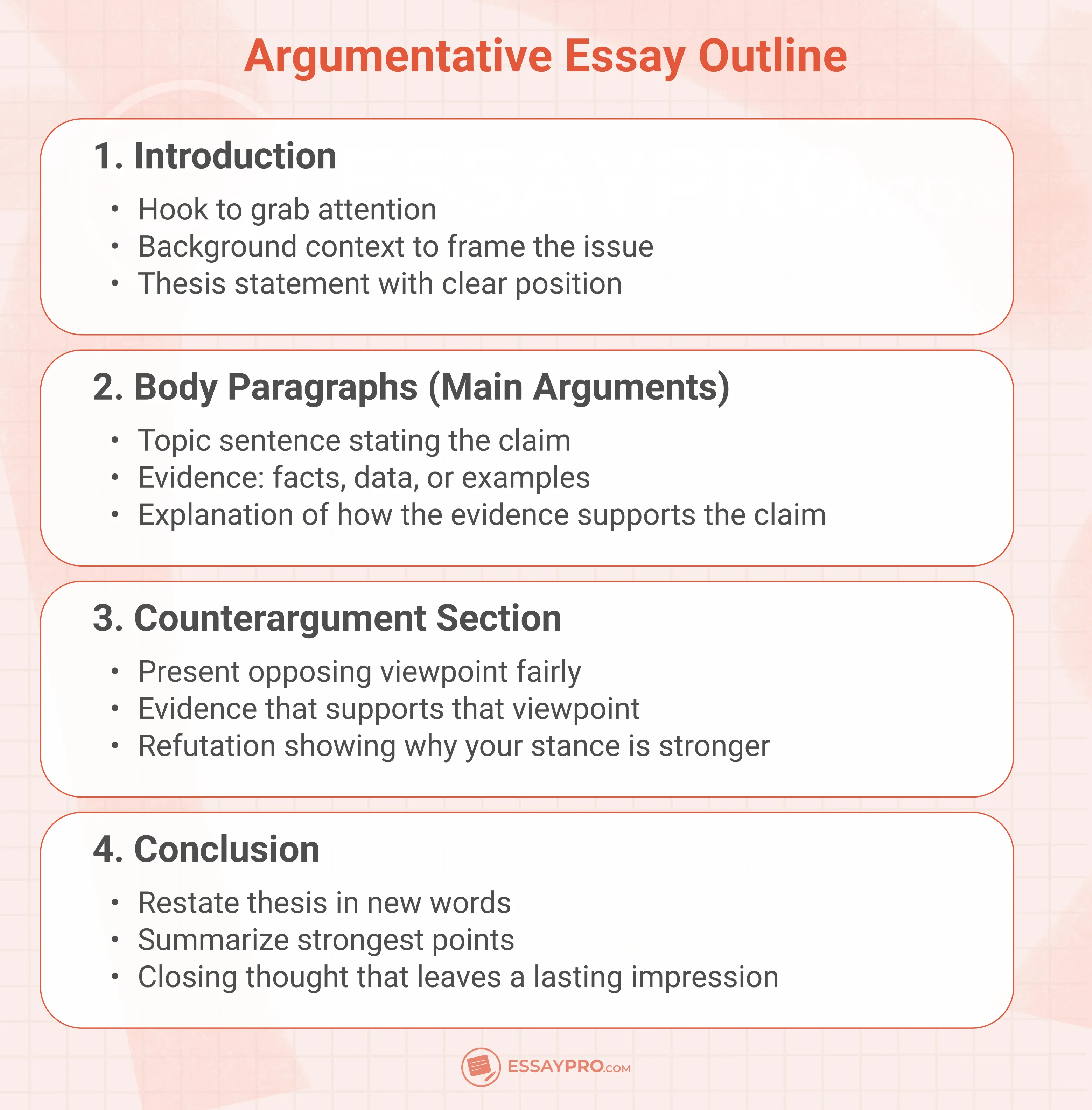The simplest answer to the question, 'What is an argumentative essay?' is this: it's a piece of writing that asks you to defend your position on a specific topic. You could also say that it's a written debate on paper.
The writer is asked to present both sides of an argument or an issue and build the case with evidence. The paper should sound like a persuasive conversation backed up by concrete proof.
This article will teach you how to build an argumentative essay outline and write one that convinces. And if you still need human help for your assignments after all this, you can rely on EssayPro's argumentative essay writer to keep your ideas flowing.
💬 Do You Have Topic Ideas You Want to Share?
Join our EssayPro Community, we’ve got more real student questions like this inside. Share yours!

Argumentative Essay Outline: Basic Structure
An argumentative essay works best when the outline is clear enough that readers never feel lost. Creating an argumentative essay structure before writing is what helps you decide the right moment for each point. Here's a simple outline:
- Introduction: You give background to frame the issue and then state your thesis statement.
- Body paragraphs: You back your claims up with evidence and explain why they matter. Each section should focus on one argument at a time.
- Counterarguments: You show that you've considered alternative views and explain why your position still holds up.
- Conclusion: Reminds the reader of your thesis statement and reinforces your perspective.
If you've ever practiced how to write an explanatory essay, you'll recognize a similar flow. The difference is that persuasion is the driving force of an argument essay.
Argumentative Essay Outline Template

A look at an easy argumentative essay format will probably do more for you than a dozen academic writing tips. Here's your free argumentative essay outline template. Enjoy!


Advanced Argumentative Essay Structure
Once you get the hang of the basic outline, you realize that some topics might need slightly different structures. That's why writers turn to a few tried-and-true models that each shape arguments in their own way.
Aristotelian (Classic)
You use the classic Aristotelian model when you need straightforward arguments. It's the clearest route when you're figuring out how to write persuasive essay, for example.
With this approach, you state the main idea and bring up potential opposing points. This way, you can show why your argument is stronger. You need to pull in credible sources and reasoning if you want to keep the reader engaged. Here's how to handle this structure:
- Introduce the particular issue and explain why it matters.
- State your thesis clearly.
- Lay out your main points with supporting evidence.
- Address the opposing arguments and refute their points.
- Conclude with a strong closing statement that reinforces your thesis.
Rogerian Approach
The Rogerian method takes a softer path. It leans into listening and compromise instead of a head-to-head battle. Lay out your own view and show that you have a deep understanding of the opposing side. Then, try to find the middle ground. These are the steps to a structured Rogerian essay:
- Introduce the issue in a neutral tone.
- Summarize the opposing side fairly.
- Present your own position in a respectful way.
- Highlight areas of agreement between both perspectives.
- Suggest a compromise or middle ground.
- Close with a solution that values both viewpoints.
Toulmin Approach
The Toulmin model breaks arguments down piece by piece. You make a claim, back it up with evidence, and explain why the evidence matters. It's more focused on the nuts and bolts of reasoning. This approach works well when you're dealing with layered debates and want to keep things logical. Here are the basic parts:
- Claim: State your argument as a direct position.
- Reasons: Back it up with convincing evidence.
- Warrant: Show how your evidence proves the claim.
- Backing: Add extra weight with additional studies and statistics.
- Qualifier: Point out where your claim applies and where it may face limits.
- Rebuttal: Address counterarguments and respond with precise evidence.
How to Write an Argumentative Essay: The Writing Process
The secret to writing a convincing argumentative essay comes down to breaking the process down. Each stage helps you shape your ideas into something leaves an impression on your reader.
Step 1. Brainstorm a Topic
The first challenge is deciding what you want to argue. You'll probably find the best topic in the materials you're already studying because they'll be connected to your field. What's important is choosing an idea that invites debate.
A strong thesis statement should allow you to explain why one option makes more sense than another. Even if you lean on a softer Rogerian approach later, you still need a side to defend. If you're stuck, you can find argumentative essay topics in our article.
These are the criteria for a good topic:
- Connection to your subject – the topic should naturally tie into the material you're studying.
- Importance – choose an issue that matters to a wider audience.
- Inherent value – look for ideas that touch on ethical or social issues.
- Potential for research – pick something with enough depth to explore further.
Step 2. Conduct Research
Research is where you figure out the side you'll stand on and where you'll face pushback from readers. As you move through books, articles, or studies, keep checking if what you're finding is accurate and recent enough to count.
Be cautious about bias, too, because it can quietly weaken your case. Strong evidence is what keeps an essay standing. If pulling sources together feels like too much, research paper help can make the whole process less stressful.
Step 3. Prepare for Writing
Now you can confidently start turning your plans into something concrete. Decide how the evidence you've collected fits together. Use your outline as the blueprint. You already know where each point belongs before you start drafting.
Start writing only after you feel your structure is solid. The first draft isn't supposed to be perfect, though. Get everything on the page. Argumentative writing leans on outside material, so if those are in place, it's easy to polish the text later. Essay writing help can give you the push you need if the process feels intimidating.
Step 4. Revising
The first draft will look rough. That's exactly how it should be. Ask yourself if the argument flows logically. Sometimes you'll spot whole sections that need to be moved around or claims that could use sharper evidence.
This is also the stage where the writing itself matters as much as the ideas. Make sure your language is clear and appropriate for the reader.
Just as a deductive essay depends on reasoning that moves step by step, your revision should guarantee the same with argumentative papers. If something, anything, feels off, you'll want to rewrite it.
Step 5. Proofreading
You'll be able to look at your essay with fresher eyes (and mind) after you've let your essay sit for a bit. Double-check that your evidence is accurate as much as correct grammar and punctuation. Make sure your thesis statement holds up after everything you've added. If you have a trusted friend or mentor who can read it, their feedback is invaluable.
Here are questions to check by yourself before submitting your argumentative essay:
- Does your thesis include a statement that anybody could argue for or against?
- Are all your arguments clear and understandable?
- Did you use the best examples to support your arguments?
- Have you managed to successfully present and refute any counterargument(s)?
- Does the conclusion give an interesting look into the future of this topic?
If deadlines are tight and you're thinking, "Could someone just write essay for me?", remember that EssayPro can help you polish your work until it's ready to submit.
Argumentative Essay Examples
Each argumentative essay example we've written below will help you get a handle on the structure of this kind of academic writing.
Tips on Writing an Argumentative Essay
When it comes to your final draft, make sure each tip listed below is considered. Here are a few ways to make your writing stronger:
- Test your argumentative essay outline out loud – talking it through helps you hear where logic falters or transitions don't flow.
- Think like a debater – imagine standing in front of an audience with just a minute to win them over.
- Ground abstract claims in lived examples – connect statistics or research to real cases or events.
- Challenge yourself with the opposite view – write a quick counterargument to your own thesis and then dismantle it.
- Study how professionals build arguments – reading polished academic work or samples from dissertation writing services can show you how you can frame complicated reasoning.
- Always check the "so what" factor – after each point, explain why it matters.
Final Thoughts
An argumentative essay only works when it's built with careful intention. Here are the most important steps and details you should remember:
- Strong argumentative writing begins with a clear outline.
- Research is the foundation of every claim.
- Reliable sources give your arguments weight.
- Revising and proofreading transform your ideas into something persuasive.
- Recognizing counterarguments shows you've considered the full scope of the debate.
For many students, that journey feels heavier than it looks on paper. EssayPro exists for exactly that reason: helping students turn drafts into college papers they feel confident about.
FAQ
What Is Argumentative Essay Format
The format of an argumentative essay usually begins with an introduction that presents a thesis, followed by paragraphs that each develop a particular point supported by evidence. At some stage, the essay needs to deal with counterarguments before moving to a conclusion that ties everything together.
How To Start An Argumentative Essay
A strong beginning pulls readers in right away. You might open with a surprising fact or even a question. After catching their attention, give a bit of context so the reader has a general idea about the issue. The introduction should close with a thesis statement that mentions your stance and points the way forward for the essay.
How To Write An Argumentative Essay
To write a good argumentative essay, you need to build a logical and convincing argument. Map out your ideas first so you know the direction you'll take. As you draft, use research and evidence that support your position.
Strong essays also take time to address counterarguments, too, showing that the writer has considered the full conversation before drawing a conclusion. The final section then reinforces the main points and leaves readers with something to think about.

Daniel Parker
is a seasoned educational writer focusing on scholarship guidance, research papers, and various forms of academic essays including reflective and narrative essays. His expertise also extends to detailed case studies. A scholar with a background in English Literature and Education, Daniel’s work on EssayPro blog aims to support students in achieving academic excellence and securing scholarships. His hobbies include reading classic literature and participating in academic forums.
- UNC-Chapel Hill Writing Center. (2024, May 14). Argument – The Writing Center • University of North Carolina at Chapel Hill. The Writing Center • University of North Carolina at Chapel Hill. https://writingcenter.unc.edu/tips-and-tools/argument/
- Argumentative Writing | UAGC Writing Center. (n.d.). https://writingcenter.uagc.edu/argumentative-writing
- Drafting an Argument Essay | University Writing & Speaking Center. (n.d.). University of Nevada, Reno. https://www.unr.edu/writing-speaking-center/writing-speaking-resources/drafting-an-argument-essay

.webp)





